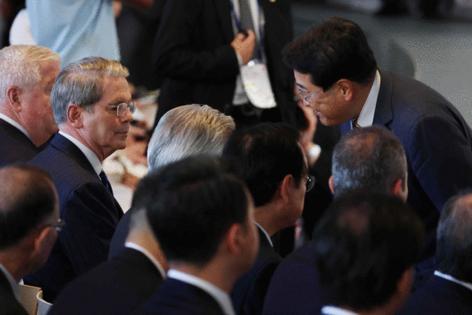Japan says US agreed to end tariff stacking and cut car levy
Published in News & Features
The U.S. confirmed it would end stacking of universal tariffs on Japan and cut car levies as promised, Tokyo’s top trade negotiator Ryosei Akazawa said after a meeting with his counterparts in Washington.
His comments following talks with Commerce Secretary Howard Lutnick and Treasury Secretary Scott Bessent provided some relief amid doubts over the details of the trade deal reached between the two countries last month.
The U.S. officials expressed regret that the stacking rule had been applied to Japan despite a verbal agreement, and said Washington would refund any overpaid levies, he said. No time frame was agreed for the implementation, Akazawa said after the meetings.
Japan was hit with higher-than-expected universal tariffs as part of the wave of new levies introduced by the Trump administration Thursday. While the scale of the discrepancy was likely minor, the confusion sparked renewed criticism of Prime Minister Shigeru Ishiba, who already faces calls to step down over a poor election showing.
“We have confirmed that when the U.S. side takes measures to revise the executive order on universal tariffs, they will issue another order to reduce tariffs on cars and auto parts,” Akazawa said. “We will continue to urge the U.S. side, through all available means and channels” to make those things happen, he said.
He added that he wasn’t sure when the orders would be issued, but he didn’t expect it to take as long as six months or a year.
Under the stacking system, the 15% tariff applied to Japan is being added to existing levies on its products. When Japan receives an exemption, Akazawa said that the 15% rate would replace existing rates on items that currently face levies of less than 15%, while items already saddled with levies higher than 15% would see no change.
More importantly for the Japanese economy, carmakers are still struggling with tariffs at 27.5% — a combination of a previous 2.5% rate and a new 25% applied by Trump.
The lack of clarity on the timing of a promised cut to 15% is making it hard for the companies, mainstays of the economy, to plan ahead. The auto sector employs roughly 8% of the nation’s workforce and is a trend setter for wage growth, which has supported the central bank’s gradual interest rate hikes.
Toyota Motor Corp. this week lowered its annual guidance as it warned of a ¥1.4 trillion ($9.5 billion) hit to its bottom line from U.S. tariffs. The world’s biggest carmaker now sees ¥3.2 trillion in operating income for the fiscal year ending in March 2026, down from its initial forecast of ¥3.8 trillion.
©2025 Bloomberg L.P. Visit bloomberg.com. Distributed by Tribune Content Agency, LLC.







Comments